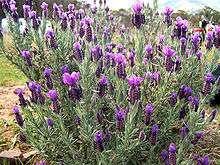lavender
English

Lavender.
Etymology
From Middle English lavendre, from Anglo-Norman lavendre (French: lavande), from Medieval Latin lavendula, possibly from Latin lividus (“bluish”), but influenced by lavare (“wash”) due to use of lavender in washing clothes.
Noun
lavender (countable and uncountable, plural lavenders)
Hyponyms
- (plant): common lavender
Derived terms
Related terms
Translations
plant
|
|
colour
See also



- Appendix:Colors
Adjective
lavender (comparative more lavender, superlative most lavender)
- Having a pale purple colour.
- (politics) Pertaining to lesbian feminism; opposing heterosexism.
Translations
Verb
lavender (third-person singular simple present lavenders, present participle lavendering, simple past and past participle lavendered)
Middle English
Etymology 1
From Old French lavandiere, from Medieval Latin lavandārius.
Pronunciation
- IPA(key): /lavənˈdeːr/, /ˈlavəndər/, /lau̯nˈdeːr/, /ˈlau̯ndər/
Noun
lavender (plural lavenderes)
- A washer; one (especially a woman) who washes clothes.
- (euphemistic) A woman employed in prostitution or having loose morals.
Related terms
Descendants
- English: launder
- Scots: launer
References
- “lavender(e (n.(1))” in MED Online, Ann Arbor, Mich.: University of Michigan, 2007, retrieved 2018-12-24.
Etymology 2
From Old French lavendre.
This article is issued from
Wiktionary.
The text is licensed under Creative
Commons - Attribution - Sharealike.
Additional terms may apply for the media files.